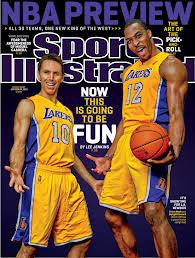I wonder if you’ve heard of Dave Zirin. I hadn’t until a couple of months ago, though I pay absurd levels of attention to life in the lucrative sandbox of professional sport. This guy is on fire. Apparently, he’s written on pro basketball for quite a while — I guess Slam is a bit too hiphophappenin’ for me — but what I’ve come across is his weekly email column “The Edge of Sports”, in which he writes on marginalized issues beyond the scores and the winning streaks and the all-star teams: racism, social justice, athletic fame and influence, the meaning of these gladiatorial entertainments. (He loves the games and many of the athletes, the more contrarian and individualistic the better.)
He’s written a book – it awaits me on my bedside table – called What’s My Name, Fool? Sports and Resistance in the United States. For those of you with good memories and long-ago birthdates, you might recognize the title as Muhammad Ali’s early insistence on having his abandonment of his “slave name” respected. Zirin is sometimes a bit strident for my taste, but he’s definitely every radical activist’s favourite sportswriter. He has the Michael Jordans of the world in his sights; MJ’s famous “Hey, Republicans buy shoes, too!” as his reason to avoid political involvement is a target of considerable contempt.
Dave Zirini has been powerfully angry on the Tookie Williams execution, wistful about Carlos Delgado’s on-again, off-again protest of the war in Iraq, and insistent about applying the simple standards of the common good to the uncommon world of big-money athletics. Today, his rant on the cosmetics of a Super Bowl hosted by Detroit, by most accounts a smoking hulk of a city, is RIGHT ON. He picks on the way in which sports have come to embody and emphasize one of the greatest obstacles to justice that we face. He zooms in on the extremes of wealth and poverty, as they are seen amid the glitz of the biggest single sporting event in the world. The Super Bowl has long been an example of gleeful and sometimes cringe-worthy excess, and here’s another take. Zirin quotes some sports writers, especially the great Mitch Albom (yes, he’s also the guy who wrote Tuesdays with Morrie, a wonderful book, and The Seven People You Meet in Heaven, which I’m not so sure about, but he’s probably the best sports columnist in North America), who are also not afraid to bite the hand the feeds them. And aware enough. And outraged enough. Leonard Cohen wrote it this way: “Everybody knows the fight was fixed / The poor stay poor, and the rich get rich / That’s how it goes…”
Dave Zirin’s column is called “Detroit: Super Bowl City on the Brink” and it can be found here. And yes, I will be watching the SB. It’s research. I’m a Man of the People. (And Troy Polamalu rocks.)

